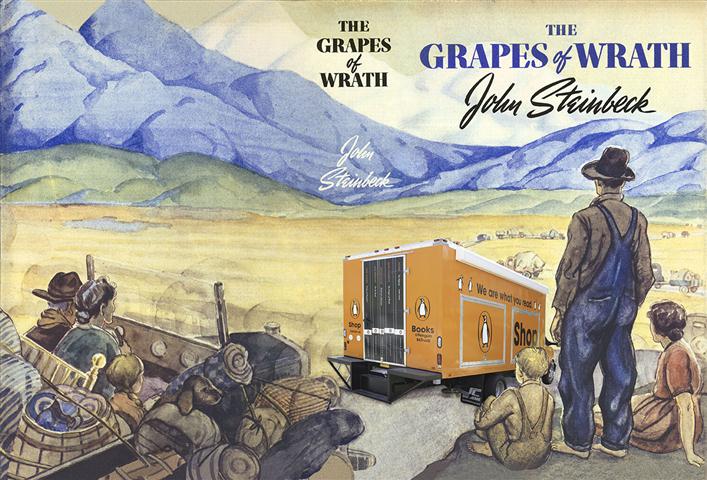书评:The Grapes of Wrath
2024-06-08
周溱
我最近看了太多不知所云的低质量小说,决定要提高一下我的文学品味。这本书 The Grapes of Wrath 出版于1939年,获1962年诺贝尔文学奖。作者 John Steinbeck 著作等身,被普遍认为是美国二十世纪的文学巨匠。这书和我常看的青少年架空文学比起来,是高级多了。书里描述的是二十世纪三十年代,美国大萧条时期,中西部破产农民被迫背井离乡的故事。
土地兼并

土地兼并在人类历史上发生了无数次,所有国家都有。美国三十年代的这一次,又有什么特别的呢?让我们细细品味:
The tenant men looked up alarmed. But what’ll happen to us? How’ll we eat?
You’ll have to get off the land. The plows’ll go through the dooryard.
And now the squatting men stood up angrily. Grandpa took up the land, and he had to kill the Indians and drive them away. And Pa was born here, and he killed weeds and snakes. And we was born here. There in the door, our children born here. A bad year came and Pa ha to borrow a little money. The bank owned the land then, we stayed and we got a little bit of what we raised.
收成不好,农民只好向银行贷款,用土地做抵押。收成又不好,又恰逢大萧条,银行涨息,农民还不起利息,银行收地,要赶人走,就这么回事。农民的想法很简单,很纯粹:
It is our land. We measured it and broke it up. We were born on it, and we got killed on it, died on it. Even if it’s no good, it’s still ours. That makes ownership, not a paper with numbers on it.
生于斯,长于斯,死于斯。要把农民赶走确实不人道啊。但是,等会儿,被你爷爷辈杀了,赶走了的印第安人怎么说?他们不也是生于斯,长于斯,死于斯吗?这次土地兼并的独特性就在于这次几乎是现世报:不到一百年前,欧洲失地农民们来到美国,靠国家暴力机器做后盾,从印第安人手里攫取了土地,期间恐怕还发过一笔小财,然后到了孙子,重孙子辈就自己变成了悲剧的主角。在1930年,少量爷爷辈的人恐怕还活着吧。他们离开土地的时候是否还能想起小时候见过的印第安人血泪西迁?
土地所有权都是经不起道德推敲的:历史上所有土地所有权的变迁,归根到底都是暴力;没有人的手是干净的。例如现在的巴勒斯坦和以色列的冲突:巴勒斯坦人说以色列人是后来者,是强盗;但以色列人还说俺们的老祖宗两千年前就来过,服了吗?
资本主义和封建主义的区别
我们生活在现代的人们都对资本主义相对封建主义的先进性深信不疑。在古代,逼的没活路的农民可以起义,美国农民都有枪,也都是见过场面(印第安战争?)的人。他们也想保护自己的财产:
I’ll be in the window with a rifle. You even come too close and I’ll shot you like a rabbit.
It’s not me. There’s nothing I can do. I’ll lose my job if I don’t do it. And look – suppose you kill me? They’ll just hang you, but long before you’re hung there’ll be another guy on the tractor, and he’ll bump the house down. You’re not killing the right guy.
That’s so, Who gave you orders? I’ll go after him. He’s the one to kill.
You’re wrong. He got his orders from the bank. The bank told him, ‘Clear those people out or it’s your job.’
Well, there’s president of the bank. There’s a board of directors. I’ll fill up the magazine of the rifle and go into the bank.
The bank gets orders from the East. The orders were: ‘Make the land show profit or we’ll close you up.’
But where does it stop? Who can we shoot? I don’t aim to starve to death before I kill the man that’s starving me.
I don’t know. Maybe there’s nobody to shoot. Maybe the thing isn’t men at all.
在封建时代,坏事是坏人做的,冤有头债有主。到了资本主义时代,坏事没有少,但坏人没有了,仇都没法报了。比如你我的退休金买了投行的大基金,大基金投资垄断公司,垄断公司压榨它的供应商,供应商开血汗工厂,血汗工厂在世界什么角落雇佣童工逼出人命,你我应不应该负责呢?我们又能负多少呢?
The bank is something else than men. It happens that every man in a bank hates what the bank does, and yet the bank does it. The bank is something more than men, I tell you. It’s the monster. Men made it, but they can’t control it.
人物对话
这本书的人物对话讲究一个真实,完全基于一百年前美国乡下口语。比如下面这段:
Like a damn ol’ graveyard ghos’. I been goin’ aroun’ the places where stuff happened. Like there’s a place over by our forty; in a gully they’s a bush. Fust time I ever laid with a girl was there. Me fourteen an’ stampin’ an’ jerkin’ an’ snortin’ like a buck deer, randy as a billygoat. So I went there an’ I laid down on the groun’, an’ I seen it all happen again. An’ there’s the place down by the barn where Pa got gored to death by a bull. An’ his blood is right in that groun’, right now. Mus’ be. Nobody never washed out. An’ I put my han’ on this groun’ where my own pa’s blood is part of it. You fellas think I’m touched?
这已经是比较好懂的一段了。不要光看,看是看不明白的;在脑子里用美语默念,是不是一个自暴自弃的中年红脖子形象跃然纸上?
Pu-raise Gawd fur vittory!
猜一下是什么意思。提示:想象一个牙快掉光了的老太太。
美国西游记?
十五章后我只是大致浏览了一下,没有仔细阅读。主人公全家开上一辆破车,告别俄克拉荷马的家乡,沿着66号公路一路向西,去往满是工作机会的加利福尼亚。一路闯过九九八十一难,最终到达加州,却发现加州并没有那么好。一些悲剧发生了,剩下的人们还顽强地活着。
我没有仔细看的原因是我无法和书里的主人公共情。是的,这些都是有血有肉的人物,他们遭遇了太多的不公平,但他们身上仍保留着着朴素的阶级感情,不假思索就互帮互助,克服种种难关。我的问题在于,我总觉得他们身上有原罪:
- 俄克拉荷马本是印第安人的家园,一百年前被这些人的祖辈强抢而来。
- 这些自然灾害,例如沙尘暴等,其实和过去两三代人过度开垦,破坏植被有直接关系。
- 谁也没有逼着他们向银行借贷,不停扩大再生产,改善生活呀?说到底,他们的生活水平在同时代对比,并没有多糟。
另外,作者还把自己投影到一个男配角身上,就是Casy。Casy原来是牧师,后来对自己的基督教信仰产生了怀疑,最终,他的思想转变到了一种朴素共产主义的方向,去组织工人运动去了。这种草根牧师受到一定的教育,能大量接触劳苦大众有共同语言,还脱离生产有闲暇时间思考哲学,社会学问题,使得他们天然地就能成为底层百姓的代言人。后来的马丁.路德.金就是一个著名例子。Casy 看到了问题所在,但没有解决方法,最终把自己也搭进去了,成为一个耶稣式的烈士。
我个人思想和搞革命抵触。革命要想成功,必须有厚黑学修为,没有的话只不过是白送死,但脸皮厚,心肠黑就不可爱了。我觉得,与其做烈士,Casy还不如继续做草根牧师,服务于劳苦大众更符合他自己的能力和定位。
